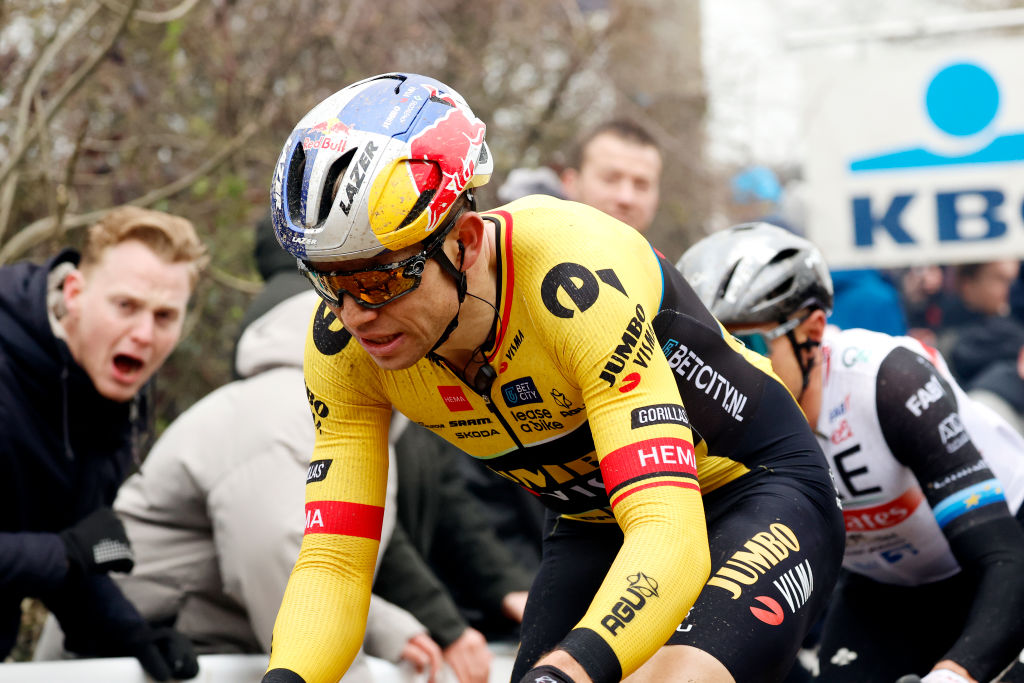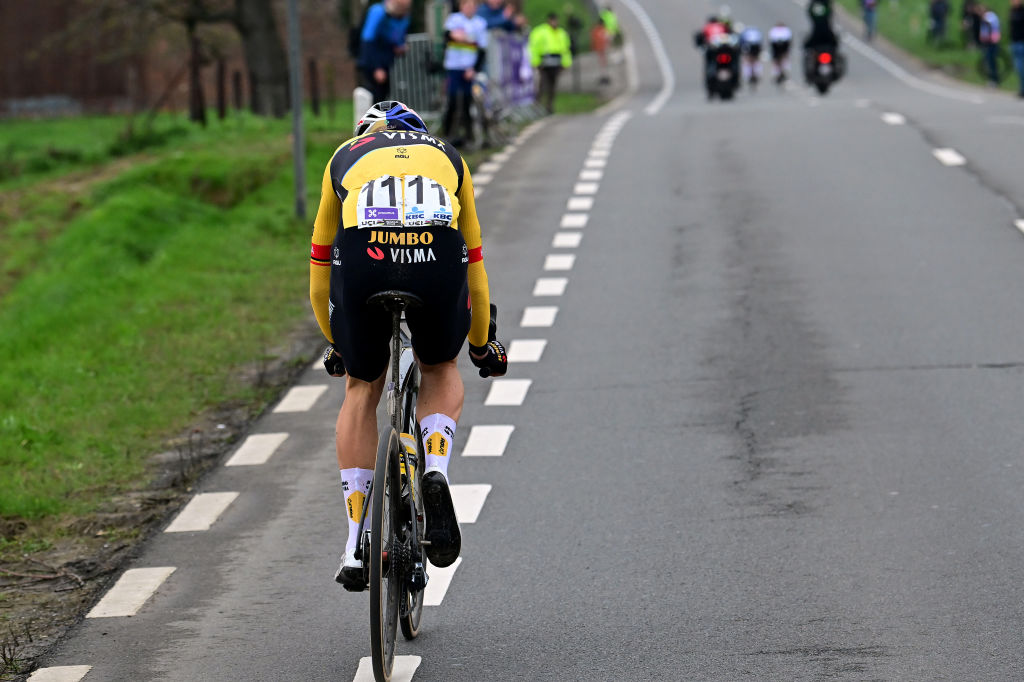‘The legs have spoken’ – Tour of Flanders stays out of reach for Van Aert
Belgian fourth after being dropped on Kruisberg by Van der Poel’s ‘bomb’

It’s lonely on the road, with only thousands upon thousands of adoring fans for company. After cresting the top of the Kruisberg, Wout van Aert still had 26km to race, but he must have sensed the Tour of Flanders was already lost.
The roar of the home crowd can only inspire a man so far at a time like this. All the good wishes in Belgium weren’t going to bridge the gap being opened by Tadej Pogačar (UAE Team Emirates) and Mathieu van der Poel (Alpecin-Deceuninck).
Van Aert was the local favourite for a Ronde always destined to fall to one of the Big Three, but he was the first of their number to blink in the finale, floored by a jab from his old sparring Van der Poel on the Kruisberg. When the Dutchman and the eventual winner Pogačar disappeared from view, Van Aert was condemned to his solitary but very public pursuit.
For a time, Van Aert managed to limit his deficit to 10 seconds, but the strength of the men ahead began to tell. Once Van der Poel and Pogačar bridged up to the earlier escapees, Van Aert’s Jumbo-Visma teammate Nathan Van Hooydonck dropped back to help the chase. By then, there was little to be done. The grandest prize of all was already out of reach.
Van Aert would eventually reach the remnants of the early break over the Kwaremont, but by the time he got there, Pogačar and Van der Poel had already been and gone. He would make it to Oudenaarde 1:12 in fourth place, beaten to the final step of the podium in the sprint by Mads Pedersen (Trek-Segafredo).
On crossing the finish line, Van Aert rolled straight through the mixed zone, his head bowed. He didn’t respond to the attempts of multiple camera crews to flag him down, but then he hadn’t even stopped to take a drink from his soigneur at the finish line. For the initial mourning period, he just needed to be alone.
Half an hour or so later, Van Aert emerged from the Jumbo-Visma bus to put words on his day. Although the Belgian won the E3 Saxo Classic against Van der Poel and Pogačar last week, he had struggled to follow them on the Kwaremont, and that knowledge seemed to weigh heavily here.
Get The Leadout Newsletter
The latest race content, interviews, features, reviews and expert buying guides, direct to your inbox!
“I was a bit surprised by Mathieu van der Poel’s bomb,” Van Aert said. “Perhaps my mind was already too preoccupied with what was yet to come. But the legs have spoken. If I couldn't keep up with that, I wouldn't have been able to follow on the Oude Kwaremont either.”
Jumbo-Visma

The fastest Tour of Flanders in history was a breathless affair from start to finish, and each of the Big Three suffered setbacks in the opening 100km or so. Van der Poel was caught out by an early split and Pogačar was caught behind an early fall, while Van Aert came down in the mass crash before the first ascent of the Kwaremont with almost 100 miles to race, though he quickly rejoined the race.
“It didn’t bother me during the race. My knee is scraped, though, so we will see tomorrow,” said Van Aert. “It was a very chaotic Ronde with many crashes, and the final was very long and tough.”
Jumbo-Visma had dominated the cobbled Classics to this point, winning at Omloop Het Nieuwsblad, Kuurne-Brussel-Kuurne, Gent-Wevelgem, E3 Harelbeke and Dwars door Vlaanderen, but ‘those yellows,’ as Patrick Lefevere called them, were never able to make their depth count on Sunday.
Van Hooydonck policed the move of dangermen that went clear on the Molenberg with 100km to go, but Tiesj Benoot and Christophe Laporte didn’t make anything like the anticipated impact.
“The race went well for our team for a long time. Nathan Van Hooydonck was in a dangerous group, and we didn't have to ride behind,” Van Aert said. “But it became a man-against-man race a bit faster than we had hoped. And Pogačar and Van der Poel proved to be stronger.”
After winning E3 Harelbeke last week, Van Aert had shouted at the camera that he had “nothing to prove,” before duly delivering another exhibition at Gent-Wevelgem two days later. In this era of dextrous talents, nobody – not even Pogačar himself – is as versatile as Van Aert, who toggles between road and cyclocross and flits between winning bunch sprints and riding as a mountain domestique.
His 2020 Milan-San Remo victory aside, however, Van Aert’s best days have not come in the Monuments, while his record in the Tour of Flanders does not match his obvious aptitude for the race. In five participations, his lone podium finish came in 2020.
Van Aert has a chance to change the narrative next week at Paris-Roubaix, but he only had thoughts for the Ronde on Sunday evening. “I came to win,” he said. “But it wasn't meant to be.”

Barry Ryan was Head of Features at Cyclingnews. He has covered professional cycling since 2010, reporting from the Tour de France, Giro d’Italia and events from Argentina to Japan. His writing has appeared in The Independent, Procycling and Cycling Plus. He is the author of The Ascent: Sean Kelly, Stephen Roche and the Rise of Irish Cycling’s Golden Generation, published by Gill Books.